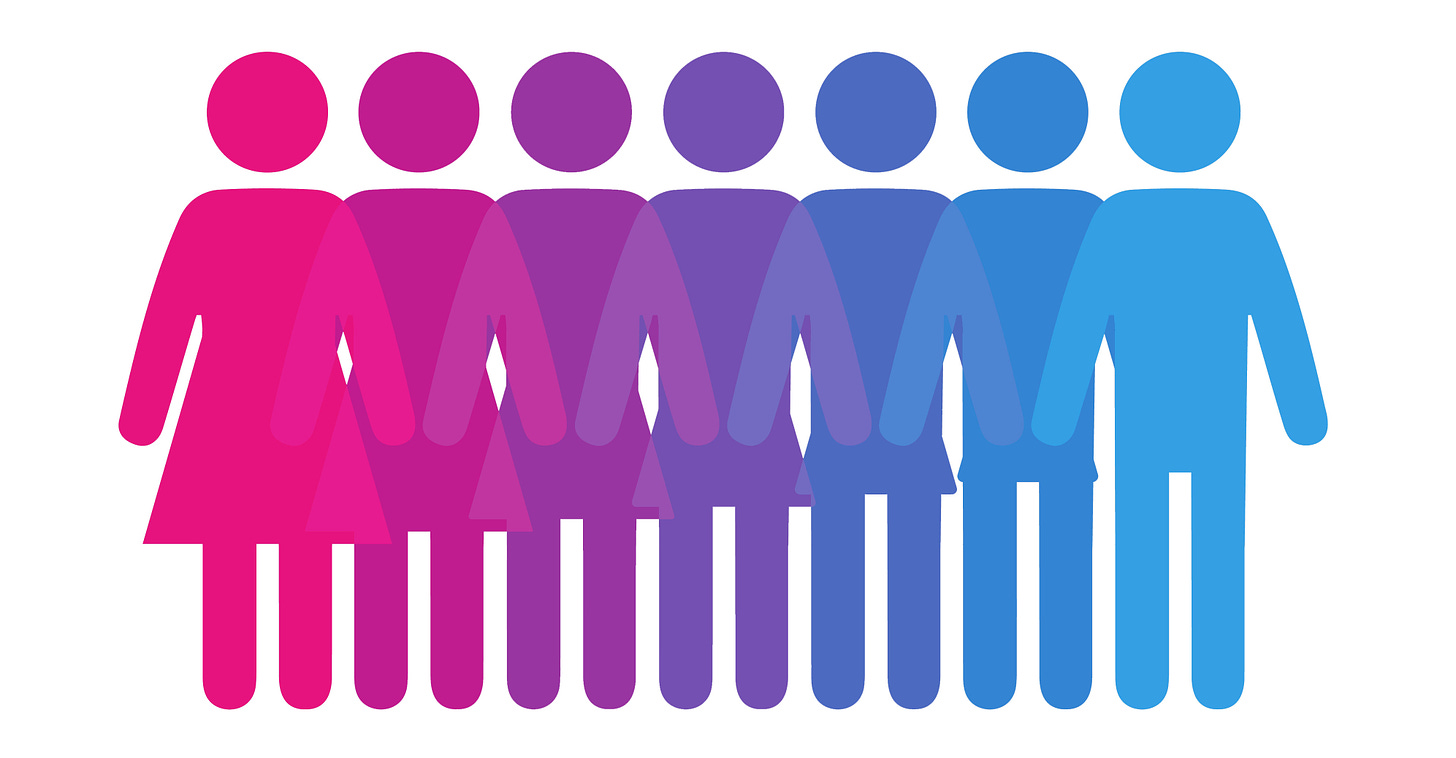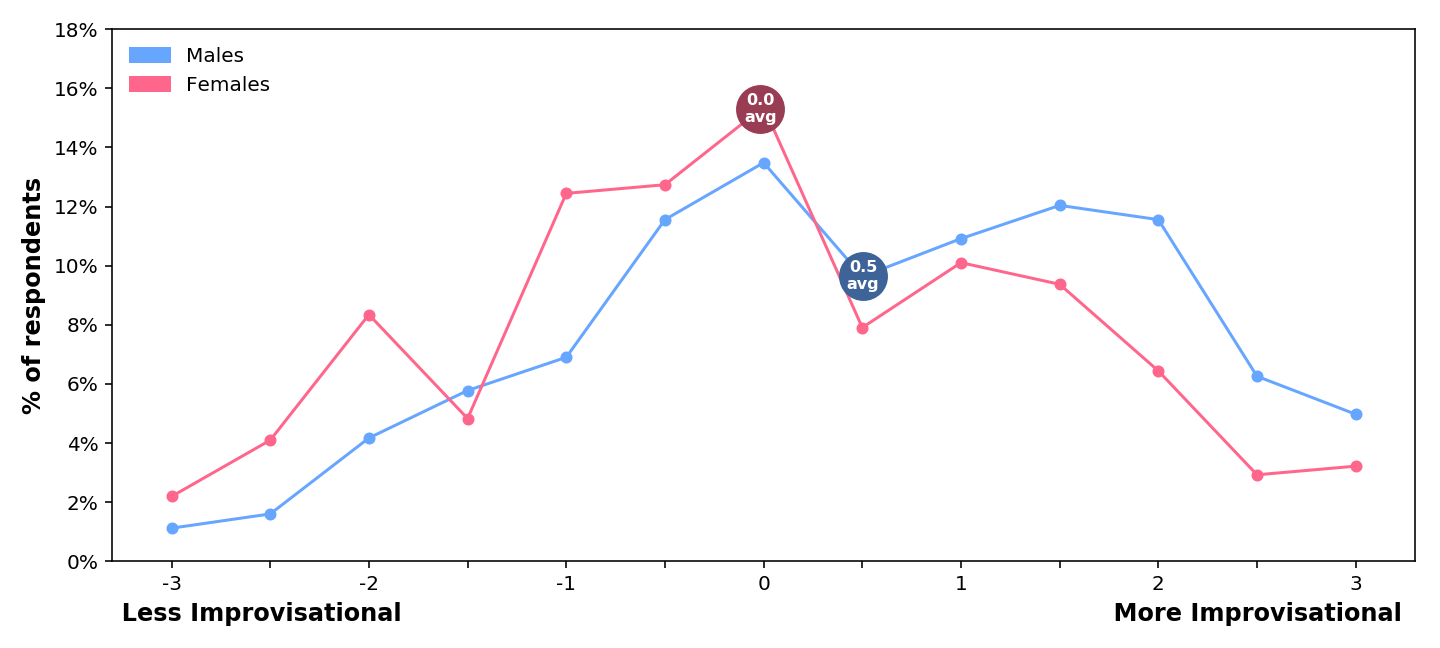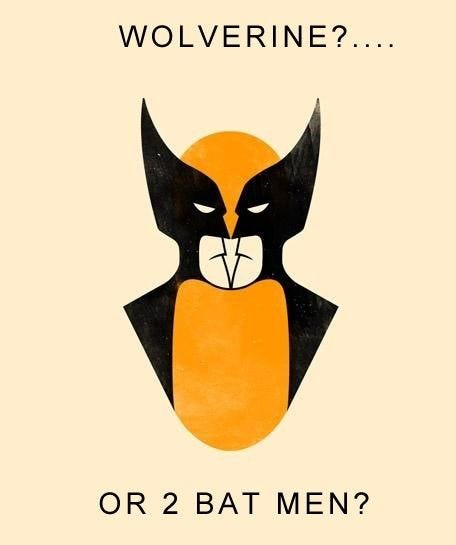Multiple people have been tripped up by my claims in the previous post that “they/them pronouns are never correct pronouns for a person whose sex isn't ambiguous” and “demanding that people call you by incorrect pronouns counts as bullying and harassment.” This post addresses the first of these two. (The later claim is addressed in my next post, here)
First, I posit that there are infinite genders, and there are only four sexes. If you already agree with either of these statements, feel free to skip to the punchline.
1. There Are Infinite Genders
Gender itself is a new-ish concept. Before the previous century, that word related primarily to linguistic rules about words. A thing that fussy grammar nazis tutted about. “Sex” described animals, “gender” described words. One of the biggest catalysts for the change in meaning of “gender” was Ruth Bader Ginsburg. When arguing sex discrimination cases before the US Supreme Court in the 1970s, she switch from “sex discrimination” to “gender discrimination,” because apparently people couldn’t stay serious in a long conversation that included the word “sex” over and over.
Let’s pause to think about that. We often ridicule British Victorians for being so uptight about sex that they wouldn’t say the word “leg” and would put little pants on the legs of their pianos so they wouldn’t be exposed (Not true, but a commonly repeated story nonetheless). And yet, in the highest court of the land, the most serious judges and lawyers of their generation couldn’t stay focused if the word “sex” was dropped repeatedly. So much so that it endangered legislation effecting half the population, and this was patched by RBG tabooing the word entirely and swapping in a grammatical construct! (sure, this was a trend already, but RBG popularized it)
Anyway.
At first gender was just a substitute word for sex, so it came in two flavors. But over the decades, it’s come to mean the way someone identifies in personality, and presents in public. The neat thing about that is that everyone has a different personality!
Clearer Thinking has a Gender Continuum Test you can take. The test is short and fun. The real gold is in the analysis afterwards. The whole thing is really great, and I cannot recommend it enough. Go, play with it, you’ll be glad you did. :)
I’m about to lift a whole bunch of stuff directly from the post-test analysis, I hope they don’t mind.
We examined over 600 different personality questions looking for differences.
We were not able to find even a single personality trait where there was a large difference in the average score of men and women
The biggest correlation we found between gender and any one personality trait was r=0.42. [… if] you tried to guess that person's gender using just that score, you'd mispredict that person's gender 31% of the time! Women are actually closer to the male average in this trait 37% of the time (i.e. they are more typically male than typically female in this trait). So that means that if there is a room of 100 women, about 37 of them will be closer to the average male score than they are to the average female score!
And remember, that was the personality trait that we found to be most predictive of gender. All the other traits that had an association with gender had a substantially weaker relationship.
Across all these personality traits, women were closer to the female average than the male average only 61% of the time, and men were closer to the male average than the female average only 57% of the time. In other words, it's extremely common for men to have quite a number of these "more female" traits, and for women to have quite a number of these "more male" traits. [emphasis added]
Only about 1% of males and 1% of females had almost entirely "more male" or almost entirely "more female" personality traits!
Take a look at the last two lines again. Nearly 40% of women and over 40% of men are closer to the average of the opposite sex than their own sex. And only 1% of each matched their sex’s average on almost all traits.
Gender is a spectrum (or continuum, if you prefer). There’s almost limitless manifestations of it. In fact, it can change over one’s lifetime, or even over a day, as one’s mood changes. I took this test today, and also several months ago, and my answers were largely similar, but didn’t quite line up. One was pretty significantly different. Personality is affected by many things, including shit that happened to you recently. Everyone is genderfluid, to some extent.
This is one reason I don’t particularly care to know anyone’s gender. It’s superfluous information, and honestly, sometimes people lie about it in order to present what they think is more socially desirable. Everyone is subject to Social Desirability Bias to some degree, and I don’t feel any compelling reason to amplify this.
Also it’s more fun to find out the old fashioned way.
2. There Are Only Four Sexes
If you are alive, you had two genetic parents. One of them was born as one of the traditional sexes (Male or Female), and the other was born as the other.
Until recently, basically all humans could be catagorized as one of the two traditional sexes. There isn’t any other option. Colin Wright is an evolution biologist who writes at Reality’s Last Stand (again, some direct lifts, hope he doesn’t mind)
males are the sex that produce small gametes (sperm) and females produce large gametes (ova). There are no intermediate gametes, which is why there is no spectrum of sex. Biological sex in humans is a binary system.
It is crucial to note, however, that the sex of individuals within a species isn’t based on whether an individual can actually produce certain gametes at any given moment. Pre-pubertal males don’t produce sperm, and some infertile adults of both sexes never produce gametes due to various infertility issues. Yet it would be incorrect to say that these individuals do not have a discernible sex, as an individual’s biological sex corresponds to one of two distinct types of evolved reproductive anatomy (i.e. ovaries or testes) that develop for the production of sperm or ova, regardless of their past, present, or future functionality.
A human’s biology is organized on a deep level around whether it developed to produce ova or sperm. Deviations from this are extremely rare, and the deviations aren’t a different sex, they are almost exclusively disorders of one of the two sexes. (But still very valuable persons!)
Or at least, that used to be the case.
With the power of modern technology, we have some measure of morphological freedom! Through years of hormone replacement, multiple surgeries, and a lot of physical training, we can mostly switch someone’s sex to the opposite sex. It’s not quie perfect… due to the limits of current technology, we can’t reforge every developmental path traveserd since early gestation. Certain physical difference are still unalterable, or can only be partially corrected. Continued medical intervention remains necessary. So the person can’t be fully catagorized as identical to their new sex. Nonetheless, the level of change is so drastic that they clearly are not the old sex anymore either.
We have created two new sexes, in the image of the old sexes. Trans Male and Trans Female, we created them.
3. Pronous Refer To Sex — Not Gender — By Necessity
In English, the third-person singular pronouns for humans match observed sex. It didn’t have to be this way, the fact that they match observed sex are an ancient linguist artifact. But that is how it works in English, and this is literally why trans people want to be addressed with the pronouns of their new sex.
I recently came upon fascinating speculation regarding the possible origin of this. “Pronoun Collision” is the problem of a pronoun being ambiguous and thus useless (or even actively confusing.)
If you wanted more pronoun-classes to reduce the probability of collisions … you could devise some other system that doesn't bake sex into the language while driving the collision rate even lower than that of the sex-based system—like using initials to form pronouns (Katherine put ker book on its shelf?), or an oral or written analogue of spatial referencing in American Sign Language (where a signer associates a name or description with a direction in space, and points in that direction for subsequent references).
The speculation is that sex-based pronouns are a natural Schelling point of ways to reduce pronoun collision, since sex is binary and easy to observe.
one might speculate that "more classes to reduce collisions" could be part of the historical explanation for grammatical gender, in conjunction with the fact that sex is binary and easy to observe. None of the other most salient features of a human can quite accomplish the same job: age is continuous rather than categorical; race is also largely continuous (clinal) and historically didn't typically vary within a tribal/community context.
Indeed, sex is binary, making for a great Schelling point to avoid such collision.1 Even the two new sexes are mirrors of the two natal sexes.2
Gender is not binary. Gender is the opposite of binary. It isas vast and diverse as the entire human population. Each gender is unique and deserves a unique label. Fortunately we already have labels that match up to the infinite genders of everyone, and those labels are people’s names. In fact, names have an advantage as high-resolution identifiers, because names are fairly stable. A gender can change from day to day or hour to hour.
Pronouns are a simplification. That is their whole point. They are low-resolution by design. Some languages have pronouns so low-resolution that they only have a single set of third-person singular pronouns, with no sex identification. There are languages of even lower resolution that don’t have a separate set for singular vs plural pronouns!
In the other direction, there are languages with additional pronoun sets for higher levels of resolution. Some have sets for formal vs informal relationships (English used to have this in the “thou/you” distinction). Some languages have inclusive vs exclusive “we” pronouns (“we (and you)” vs “we (but not you)”). Some languages have different pronoun sets to differentiate animate vs inanimate objects. There’s even languages that have pronouns that differentiate the owner of an object!
4. What Does This Have To Do With They/Them Pronouns?
The other reason sex makes a good Schelling point is that it’s easy to observe. But it’s not boundlessly easy. Mistakes are sometimes made.3 Using the wrong pronouns is embarrassing to both parties. Often, we have an easy way to correct this. The misgendered person corrects the speaker, then the speaker says “Whoops, my bad!” and corrects their mental model of the person.
Sometimes, though, this isn’t viable.
4a - Ambiguous They
When a subject isn’t fixed and could thus be of either sex, official doctrine is (or was, until this century) that “he or she” is to be used. This works for a low number of instances, but it gets clunky when used over and over.4
Also “he or she” works less well when referring to a specific person who’s name and sex you don’t know, and is likewise quite bad when a speaker wants to hide a subject’s sex (to preserve anonymity perhaps), because in both cases it draws attention to the omission of the sex. (I mean, using “they” does too, but it’s not nearly as glaring)
The slang usage of “they” slowly took over the role of “he or she” to alleviate all these problems. This is still resisted in the strictest grammar nazi circles, but who cares about some filthy prescriptivists? “They” will do in place of “he or she” for basically all purposes.
Thus it is resolved - Use of they/them is totes legit usage for when sex is unknown, variable, or hidden.
4b - Transitioning They
With the creation of the two new sexes, there became another use for Ambiguous They. The process of changing one’s sex is long and arduous. Most people cannot afford to do so in hiding, nor do most of them wish to do so! There are long stretches in the middle of this process where many traits are in a liminal, changing stage, and one’s sex cannot be easily resolve either way by observers.
In such cases, using either “he” or “she” triggers category-error flags in the minds of speakers. This is particularly distressing for speakers with high scrupulosity (please see the following post for more details). It may also cause distress in the transitioning people themselves, if they are aware that they don’t “pass” yet and are being humored. And “he or she” can be even worse! For many people, the least bad resolution to this is to use the Ambiguous They. It acknowledges up front that the observed sex is actually pretty ambiguous right now, and that’s OK.
4b - Troll They
Absurd as it seems to us, there is a large contingent of people that truly believes that pronouns refer to gender. They often will request, and sometimes demand, that other people refer to them exclusively with “they/them” pronouns. They declare that this is because they are “outside the gender binary.”
The following is addressed to Them.
My dude. EVERYONE is outside the “gender binary.” You are not the first person to discover that stereotypes suck and you’d rather not be stereotyped. You are, however, denying the reality that gender is a spectrum. You are reducing it down to a “binary” that applies to all the muggles, but that you are exempt from. Technically, this makes it trinary, and it is still infinitely wrong. More importantly, it shits on everyone who is a complex, multi-faceted, and ever-shifting person but who hasn’t adopted your ridiculous verbal imperialism by relegating them to the roles of simple binaries.
Pronouns refer to sex. Some of the They/Thems acknowledge this implicitly by their actions. They at least have the good grace to try to obfuscate their sex. It’s stupid, and IMO it’s demeaning to the struggles of trans people. But it’s an acknowledgment of the fact that using Ambiguous They is natural, and they wish to do less harm to the neurologically scrupulous by being ambiguous.
But the contingent of They/Thems that don’t even bother to do that? That just prance about as perfectly cis people, and seem to think that they are a special class of non-sex humans? They don’t have a leg to stand on. They/them pronouns are never correct pronouns for a person whose sex isn't ambiguous.
This wouldn’t even be a big deal if they just were weirdos with weird requests, like 13-year-old Eneasz-sama. But instead, a vocal portion of them (hopefully a minority?) actually bully and harass other to enforce conformity. This will be the subject of tomorrow’s post.
Also, now that I’m at the end of this post, I see it’s taken me over six hours to write. Tomorrow might technically be the day after tomorrow, we’ll see what I can do.
I kinda love this speculation because I have on more than one occasion made two major characters opposite sexes when writing, so it was easier to refer to his actions and her actions or speaking lines without needing to refer back to names frequently.
Tangent: Once our tech level gets to the point where such a change is perfect, the new sexes will vanish (or nearly so, remaining primarily as nostalgic eccentricities). These sexes will only be around for the period of time where we are transitioning from no morphological freedom to full morphological freedom, making them trans on the meta level as well.
“It” used to be used for small children, whose sex is not easy to observe (unless disambiguated by clothing or other cosmetic choices by parents), but this fell out of favor, over time.
RPG source books in particular had a huge problem with this, since they are entirely about conceptual characters that could be anyone. Several of them solved this by using male pronouns in odd numbered chapters, and female pronouns in even numbered chapters. One particularly cheeky source book changed which pronouns it used based on page number, which must have been a nightmare to format. I wish I could remember the system, it was small and obscure, and they deserve recognition for that feat of editing. :)












In German there are three pronouns for third person singular, same as in English ("Er", "Sie", "Es", equivalent to "He", "She" and "It"). The difference is that in English every nonhuman is always an "It". In German the moon is male and the sun is female (in French it's the opposite btw), a tree is "er", a door is "sie" and a house is "es". It is a fairly even split between the three for all things.
A boy is "er", a girl is "it", a child is "it", a man is "er", a woman is "sie" and a human is "er". Most words that describe grownups come in male and female variants. For example a male medical doctor is an "Arzt", the female version is "Ärztin".
There's a bit of a debate going on about how to write it in texts to adress both sexes equally without putting one in front of the other. It is mostly about removing expectations about professions, such as that doctors are male and nurses are female (as you would assume when people write "Ärzte und Krankenschwestern", with "Ärzte" being the plural form of the male doctor and "Krankenschwestern being the plural form of the female nurse), so that children don't automatically (even subconsciously) assume that a profession isn't for them because they are of the wrong sex.
So instead of "Ärzte und Krankenschwestern" people would for example now write "Ärzt*innen und Krankenpfleger*innen" to sort of have both the plural male and plural female version of the word used at the same time. (There is no exact male version of "Krankenschwester", "Krankenpfleger" is the male equivalent and "Krankenpflegerin" is the female version of that word)
I put that whole wall fo text here because as far as I know that problem doesn't exist in the English language and I thought it might be interesting to know about it for non-German speakers. Of course the debate is mostly because of people being against the language changing and also some people are coming up with their own solutions (for example I know someone who always uses the female plural version of a profession unless they know that the group they are talking about is exclusively male). Right now I don't know what will establish itself as the accepted norm for the future.
Eneasz has already seen this (and commented) but for anyone else who's interested, I did a twitter thread in response to this, which might be of interest to you if this post was:
https://twitter.com/fromaitozombie/status/1533821600830726145